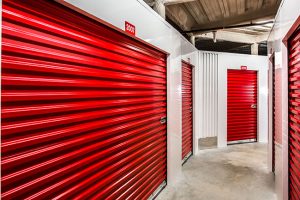Metal roll-up doors are designed specifically to offer security and durability in a variety of applications. MBCI offers a series of roll-up doors to service the self-storage and commercial markets.
Here, we’ll provide some key product details to help guide you to the right product for your application.
Self-Storage Doors
Built to meet the specific and unique demands of a small structure, MBCI doors offer many standard features that make it a superior choice. These include a proprietary gear-driven tensioning bracket for safe and easy adjustments, a rust-resistant aluminum bottom bar to protect against the elements, and a standard stainless steel latch.
650 Series: The best choice for a low-maintenance, wind-certified self-storage roll-up door.
Transform your storage building’s exterior and protect your tenants’ assets with the 650 Series steel-curtain roll-up door. Wind-load tested in accordance with IBC, FBC, and TDI, the wind-certified 650 Series was engineered to protect and maintain building envelopes in extreme conditions without the heavy, weighted elements required in frequent commercial use. The 650 Series provides tenants and facility or building owners peace of mind with sturdy construction that requires little to no maintenance. Wind-rated up to 8’ 8” and approximately 90 mph, the 650 Series door is ideal in coastal areas that experience large wind gusts and hurricanes and comes with a 30-year film integrity warranty and up to 25-year chalk and fade warranty. Our 650 Series offers insulation for better energy efficiency and is perfect for climate-controlled storage. We also offer top and side draft stop kits to reduce drafts.
690 Series: The premium choice for mini-warehouse and self-storage buildings in areas susceptible to extreme winds.
The 690 Series steel-curtain roll-up door is designed to operate smoothly and perform well in severe weather. They won’t buckle, bow, become misaligned from the tracks, or separate from the door frame during strong storms and wind events. Featuring 16-gauge galvanized steel guides and a wind bar, the 690 Series is wind-rated up to 10’ and approximately 140 mph—ensuring they meet mini-warehouse wind-load requirements. Our metal roll-up doors are wind-load tested in accordance with IBC, FBC, and TDI, allowing facility managers to avoid higher up-front insurance costs and reduce maintenance costs and downtime in the event of a storm. For climate-controlled units, our 690 Series offers insulation to help improve energy efficiency along with our top and side draft kits.

Commercial Series
MBCI’s commercial-grade, steel curtain roll-up doors offer tremendous versatility, and unparalleled quality, are easy to install, and require minimal maintenance. With a variety of models, colors, and mounting options, it is our goal to provide the right door for any application and back it with the best warranty you can find. These commercial doors are available as light gauge and heavy gauge; some options are wind-certified.
Light-duty roll-up doors: Quality roll-up steel doors engineered to withstand frequent use and outperform others in the industry.
MBCI offers two steel roll-up doors ideal for light-duty commercial use in everything from warehouses and farms to recreational storage and auto body shops. Available with electric motors and multiple mounting options, the 1950 Series and 2000 Series are versatile and low maintenance.
1950 Series: Known for operating quietly and requiring less headroom, the 1950 Series door is suitable for a number of light-duty commercial and recreational uses.
2000 Series: The 2000 Series is the perfect door for light-duty applications that require frequent use.
Heavy-duty roll-up doors: The integrity, partnership, and quality behind the design and production of our heavy-duty commercial doors make them the most durable and reliable in the industry.
Perfect for high-traffic use, our heavy-duty, commercial-grade metal roll-up doors are suitable for warehouses, loading docks, terminals, and distribution centers. Our quality sets us apart; every MBCI commercial door features heavy-duty brackets made of a .187-thick angle, high-cycle spring life, and continuous-duty design. Wind-load tested in accordance with IBC, FBC, and TDI, our heavy-duty commercial-grade doors is wind-certified to meet stringent building codes in coastal regions, including Florida and Texas.
2500 Series: Our 2500 Series is a heavy-duty sheet door suitable for warehouse and freight buildings.
3100 Series: Wind-rated and available up to 16′ wide, the 3100 Series will last for years with little to no maintenance.
Wind-certified doors: Commercial metal roll-up doors from MBCI are wind certified to perform against high winds and meet building codes. Fueled by constant changes in local and national building codes, as well as increasing insurance costs, doors with validated wind certification can dramatically reduce maintenance and replacement costs and minimize downtime. MBCI’s wind-certified doors are wind load tested in accordance with BC, FBC, and TDI.
(Note: MBCI’s 2500 and 3100 Series are all wind-certified commercial door options.)
MBCI delivers the highest quality metal roll-up door products and services that seamlessly integrate into new or existing building projects. Regardless of the project scope or wind and weather variables, MBCI has the right solution when it comes to roll-up doors for self-storage or commercial needs. Download our capabilities brochure or contact your local MBCI representative to learn more about which product is right for you.